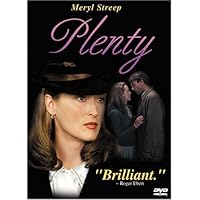
Average Reviews:

(More customer reviews)Meryl Streep gives a heartbreaking performance in this deeply affecting and brilliant film about a woman trapped forever in the past. Susan Traherne might appear on paper to be a selfish and unlikable woman, but Streep somehow manages to let the audience see her inner anguish and restlessness, and her quiet desperation at not being able to recapture the feeling of living life to its fullest; something she experienced during WWII as a Resistance fighter in France. It is one of the most exquisite performances ever captured on film.
Fred Schepisi crafted this Edward R. Pressman produced RKO film from a play by David Hare. There is a fine cast which lend support to Meryl Streep, including a winning turn from Tracey Ullman as Susan's wild and irreverent friend, Alice Park. Beautifully shot in several countries, the viewer feels as if they too are trapped in a moment in time. It is a poignant and wistfull moment, however, and in the end, the ache that runs through this story is fully driven home by a flashback of a joyful Susan shortly after the war ended.
When the film opens, Susan is waiting in the dark with other Resistance fighters when a paratrooper they had not been expecting lands in their area. Sam Neill is Lazar, who has landed far from his intended location. Once the weapons are lowered and he is identified, Susan will escort him to the nearby village. Lazar saves her life from a group of Germans on night patrol, and Susan's vulnerability in that moment bonds the two together in a tender manner brought about by war.
Susan and Lazar will share a brief but intense intimacy only those who have shared some danger with another can understand. When he gets the message to leave due to impending danger, he will leave behind a momento of the time they shared that she will carry with her for life; a reminder of a life with meaning she longs to return to. The Germans murder a man in the streets they believe to be Lazar, while he escapes by bicycle. Susan watches as her life disappears with a touch of the cap; the only gesture he dare show.
Susan after the war is restless and strong willed. She wants to change everything but does not know how. She is unable to remain ensconced in a job or situation for any length of time and longs for that hour or two during the Resistance when she saw bravery, and the best in people. It is much more than nostalgia, but a paralyzing ache that will cause her to always move on. Streep lets us see into Susan's soul, and rather than being unsympathetic because of her character's outward actions, we fall in love with her from the inside out and want to save her.
She meets a diplomat named Raymond Brock (Charles Dance) who shows kindness to her in a sensitive situation. They have a romance that will eventually come to an end, or so it would seem, when she can not leave the past in France behind and move forward with her life. The one constant during all this turmoil is the spirited Alice (Tracey Ullman). She is a free soul and lives her life as she pleases, which is often to her detriment.
Susan's anguish begins to worsen, and once she makes a proposition to a bloke named Mick, her world begins to unravel. Sting is very good as Mick, who is in way over his head with Susan and her friend Alice. Just over his head is where the bullets will land when Susan finally has a mental breakdown. It is Raymond who will return to pick up the pieces. When the ambassador, portrayed with stoic flair by John Gielgud, decides to resign, Raymond will get a post in Egypt, where Susan is far from Europe and her memories.
She is also far from herself, as her friend Alice will discover when she comes to visit. The languid pace and sandy colors of Egypt would seem to agree with Susan. She is lovely and sedate, but it is because she is, in fact, sedated. Susan is a picture of serenity, but her spirit is not in evidence. It is only when Alice speaks to Raymond in her defence that she shows a glimmer of her former self.
The seed has been planted, and when the ambassador dies, Susan decides to return to England for the funeral, against her husband's wishes. It is in England she will remain, forcing Raymond to abandon his post, effectively ruining his career. Susan does not want him to suffer because of her, and has a talk with his superior with disastrous results. It will force a confrontation between she and Raymond in which she will leave her home. It is a poignant scene as she walks down the street, a bit unsteady. We know she will never return.
Lazar tracks her down from a BBC broadcast about the Resistance, and they have a reunion which proves to be too late. France is too far away to reach after so much damage has been done. We will see a joyful and hopeful Susan in a golden field in France after the war, and our hearts will break at a life which never happened.
Magnificent is not a strong enough word for Meryl Streep's performance in "Plenty." It is one of the most memorable you will ever see in film. A beautiful refrain played by the London Symphony Orchestra haunts this film, and each time I hear it still, I see Meryl Streep in that field in France, with a world of promise in front of her. This is a movie, and a performance, no film lover should miss.
Click Here to see more reviews about: Plenty (1985)

0 comments:
Post a Comment